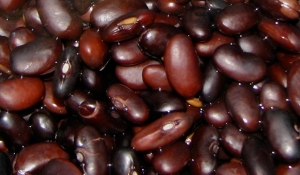In a bean-producing and bean-consuming country, smack in the middle of a bean-eating, bean-growing part of the world, beans are being shipped in from nearly 9,000 miles (14,000 km) away. And amazingly, despite the miles traveled from field to fork, these beans sell for 35-50 cents less per pound than locally grown beans. It was supposedly a venture that required collaboration between the Chinese government and the agricultural ministry in El Salvador, and this joint venture was meant to "benefit the citizens" of El Salvador. With short-term imported cheap food? Personally, I would like to see the Ministry of Agriculture (MAg) invest in long-term solutions such as providing education and resources to implement sustainable farming practices and seed saving techniques. Methods to reduce erosion, to capture rainwater for irrigation, to restore soil health, to fight insects or plant diseases without chemicals, to bring the product from harvest to market with minimal loss...these are topics that would truly benefit the citizens. But instead, what is the biggest complaint? That the cheap Chinese beans are only being sold in 5-pound bags, which is difficult for many people to afford (yes, the $3.75 is a stretch for many campesinos). Which is why it's obvious that only solutions that are rooted in longevity will have any lasting impact. The MAg says is has at least enough beans to cover all people in the department of La Union for 15 days. After that, what?
This bean import is being complemented by a corn import. But in this case, the importation causes the corn prices to rise despite the fact that the corn is only coming from Guatemala, Nicaragua and Honduras. This importation is causing worry on the minds of local (Salvadoran) farmers. They fear that the importers will have too much inventory when the harvest comes locally (which is the end of September into October), and this glut will cause prices to drop below what could otherwise be earned without the imported corn saturating the market. But let's dig down to the root of the issue: the reason the corn harvest is late here in El Salvador is because the rainy season began and then suddenly stopped for a couple of weeks (this was back in May). During that 2-week dry spell, all of the little corn seedlings desiccated and most died. Farmers had to turn the fields and replant when the rains started again, putting them about a month behind schedule. What could have prevented this? Very simple irrigation systems. Especially those farmers that sow their seeds on hills - these systems could be low-tech gravity fed systems. With a little proper investing and focusing on long-term solutions, many problems can be prevented!

No comments:
Post a Comment